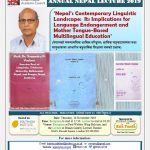News Britain - Nepal Academic Council › News
Latest News
Final Conference Programme: BNAC Nepal Study Days, 13-14 May 2024The final conference programme of BNAC Nepal Study Days, 13-14 May 2024, Royal Botanic Gardens Edinb...
Read MoreVanicka Arora (University of Stirling) awarded BNAC PhD Dissertation Prize 2023
April 24, 202324 April 2023
The Britain-Nepal Academic Council (BNAC)’s PhD Dissertation Prize 2023 has been awarded to Vanicka Arora for her PhD thesis chapter ‘Ritual in Reconstruction’.
Vanicka Arora was recently appointed as a Lecturer in Heritage at the University of Stirling; her thesis was submitted to the University of Western Sydney in 2022. Her research focused on the post-earthquake reconstruction of built heritage in the city of Bhaktapur. The thesis examines reconstruction through three frames: ‘reconstruction-as-restoration’ framed by the field of heritage conservation, ‘reconstruction-as-recovery’, framed by the field of disaster risk management, and ‘reconstruction-as-renewal’ framed by local practices of care and repair. It traces the diverse trajectories of heritage reconstruction projects through a fourth frame, which Vanicka calls ‘reconstruction-in-practice’. The submitted chapter examines how sacred rituals interact with the secular rituals of bureaucracy and expertise to authorise and validate reconstruction, particularly in the context of buildings that are both sacred and institutionally recognised ‘heritage’. It traces the various rituals and procedures that underpin reconstruction, discusses the ways in which reconstruction assigns meanings and values to buildings, and explores how Newar building and rebuilding practices and management systems have been adapted through modern governance in Bhaktapur and vice versa.
The panel found the chapter to be fluently written and beautifully structured. It draws upon an excellent range of different sources and incorporates the perspectives not just of local leaders and technocrats but also of the ordinary people who live in this environment. The argumentation is clear and accessible, even to a non-specialist in this field, and the judicious use of personal field notes and well-chosen photographs brings it to life.
Runner-up prizes have also been awarded to Sanjay Sharma (National University of Singapore), for his chapter ‘Digital Ethnography during the Pandemic: A Methodological Turn’ and Roberta Mandoki (Heidelberg University) for her chapter ‘Ageing with Place: Kuleshwor Awas Kshetra’s senior residents’.
Sanjay Sharma’s thesis focuses on the transnational movement of Gurkha women, asking how patriarchy has shaped their migration experiences and how they are subsequently represented in social memory. The submitted paper focuses on Sharma’s turn to digital ethnography when the COVID-19 pandemic halted his plans to carry out fieldwork in Nepal and the UK. It explores the ways in which Sharma adapted to the pandemic by employing emerging tools like ‘patchwork ethnography’ and ‘virtual kuragraphy’ which he sees as marking a methodological turn in social science research, centralising the use of tools that have so far been overlooked. Sharma’s paper expands the scope of ethnography by elaborating on the use of innovative methods in constraining environments while also giving back to the communities in different ways. He employs a feminist ethics of care and self-reflexivity throughout the paper that adds to the richness of the data while also showcasing his skills as a researcher.
Roberta Mandoki’s PhD thesis focuses on an ethnographic depiction of the profound transformations and renegotiations of ageing and care in Nepal from the perspective of older persons from the Kathmandu Valley’s urban middle classes. In her submitted paper, Mandoki focuses on the individual accounts of senior residents who reflect on the impact of middle-class education, mobility and materiality on contemporary intergenerational care and introduces the efforts of the local welfare organisation to find creative, collective ways in which to respond to these tremendous shifts. The strength of the paper lies in its interdisciplinary perspectives on ageing in Nepal, with space and its connection to urbanisation, social mobility and education. This also includes challenges in ageing together and/or loneliness experienced by the ageing population, a globalised society due to the migration of younger family members in search of a better life. It also highlights the need to think about new ways of care for the ageing population in the diverse urban society of Nepal.
Our hearty congratulations to the winner and to both runners up.
BNAC Dissertation Chapter Prize judging panel:
Professor Michael Hutt (SOAS and University of Oxford)
Dr. Kumud Rana (University of Lancaster)
Dr. Rajeeb Shah (University of Huddersfield)


